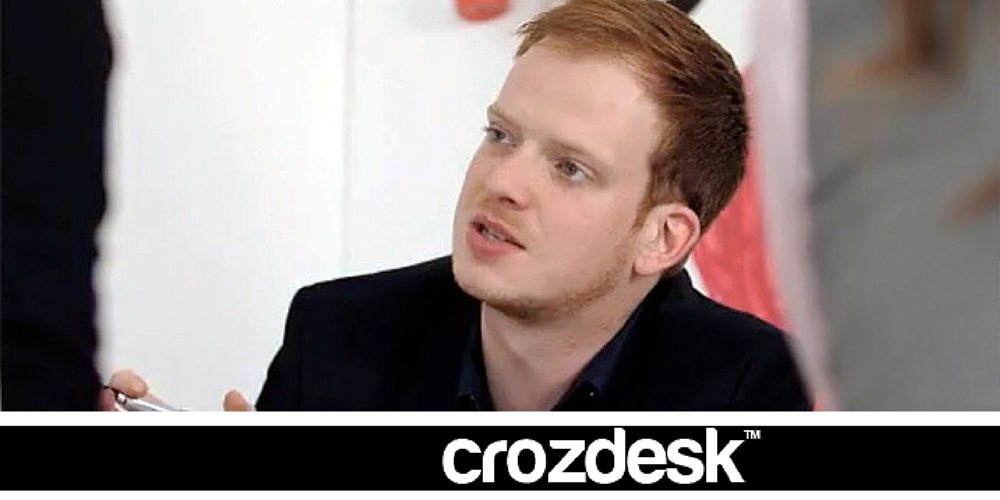Nicholas Hopper is the founder of Crozdesk, a web service that makes it easy to sort through online apps and cloud based services by categories, price, reviews or popularity etc.
Behind this new platform is a team of developers, designers, and entrepreneurs hoping to change the way we find web services.
Please tell us a little bit about your company – what is Crozdesk all about?
Corzdesk.com is a cloud services platform, which makes it incredibly easy for startups, small businesses and individuals to compare and discover the right web tools. There’s a wide array of different services available for virtually any purpose, but research is difficult and resources generally biased and opaque. Our platform and other product channels take this pain away and make selection quick and easy.
What are some of the projects you are working on right now?
We just released our Chrome Plugin – the Crozdesk Web App Explorer, which provides the same advice our users are used to from Crozdesk.com on the go. Every time you come across an online service in our ever-growing database you’ll get great advice and suggestions for alternatives, right in your browser. We just released the first version and are now working on adding great new features for upcoming versions.
Another major project we are working on is our Crozdesk scoring algorithm. We are working on the first industry-wide SaaS scoring algorithm, which automatically takes into account a wide array of user satisfaction, engagement, traffic and other data from numerous sources, which will allow us to score services and their value-add well before they have been reviewed by users. This and other projects I cannot go into just yet, will add a whole other dimension to evaluating SaaS services and are bound to give our product the competitive edge.
What would you say are the top 3 skills needed to be a successful entrepreneur, and why?
Determination, Perseverance & Adaptability: you need to embrace uncertainty. In the early days of a startup, nothing is set in stone. You need to be able to chuck major parts of what you have been working on out the window and start again. While you should always plan ahead as much as possible, your plan should be changed and updated all the time. You can’t get discouraged if something doesn’t work out the way you envisioned it – adaptability to new information and changing circumstances is key. It takes real determination and perseverance to give up on some parts of your idea that don’t work and shift focus to others. It isn’t easy, but crucial if you want to succeed.
What were the top 3 mistakes you made starting your business and what did you learn from it?
Starting with the wrong team: when you have decided to take the leap and start your own business, finding the right team is crucial. When I started I recruited a team of friends, which very quickly dissipated once it became clear that their skills and ambitions were different from what was required. After loosing my initial team, I did the same mistake again. I recruited someone who had a skill-set largely similar to my own and was in it for the wrong reasons. I was too quick to commit, since I wanted to get started as quickly as possible. When he quit nearly everything fell apart. Only the third time around I finally made sure to find the right people to complement my own background and managed to salvage the business. Don’t settle for the wrong people! You will regret it.
Underestimating bureaucracy: when I started initially I was a little disillusioned when it came to scheduling administrative tasks. Trying to run a lean startup, doesn’t save you from delays beyond your control. We lost weeks waiting for the bank and public authorities, who kept loosing documents and overpromised on multiple counts. Plan ahead and leave ample time to account for bureaucratic problems.
Focusing too little on Marketing and PR from the start: a lot of people think that the build it and they will come approach works. There are a select few companies that make it over-night – you should always have a backup plan at hand. When we started we did not have a clearly defined go-to-market strategy. It took us a while to work out which traction channels are important for us and manage to build an engaged user base. Spending more time on this in the early days could have helped us grow faster from the get go.
What are the top 3 online tools and resources you’re currently using to grow your company?
- Crowdfire: this is a nifty tool, which helps you grow your Twitter following and engagement – great for early stage growthhacking.
- Buffer: Buffer makes social media management quick and easy and leaves plenty of time for other tasks.
- Swayy: We use Swayy for quick content suggestions to share across our social media channels.
These three tools require only a few minutes of attention every day and have the potential to make social media managers in small startups obsolete.
What are three books or courses you recommend for entrepreneurs?
‘The Lean Startup’ and ‘Zero to One’ will give you two largely different views of the startup approach, which both have their individual merit and ‘The Fortune Cookie Principle’ teaches you how to sell your ideas better and build an effective brand.
What is your favorite entrepreneurship quote?
“100% of nothing is still nothing!” – so don’t be afraid to share ownership of your company with the right people – it’ll get you further…
How can our community get in touch with you?
You can use the contact or feedback forms on crozdesk.com. I read every single message that comes through. Any feedback and questions are always welcome.
- CrunchBase: https://www.crunchbase.com/organization/crozdesk
- AngelList: https://angel.co/crozdesk
- Twitter: @crozdesk








